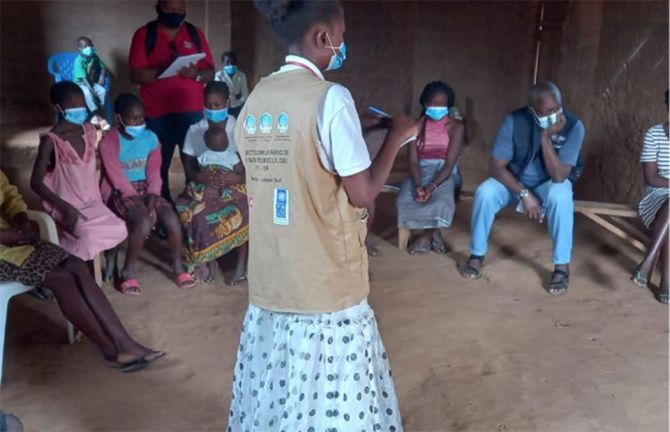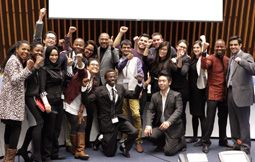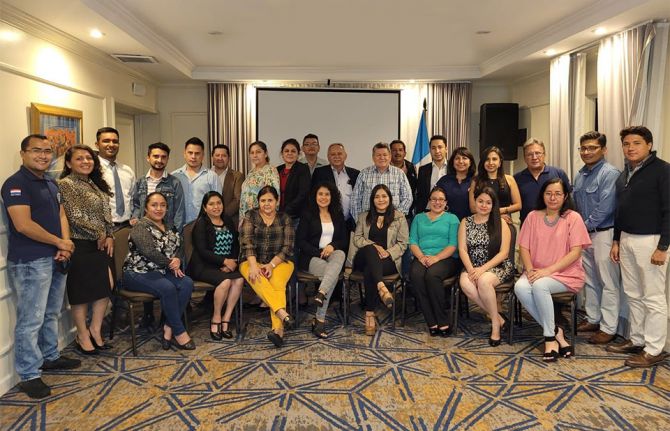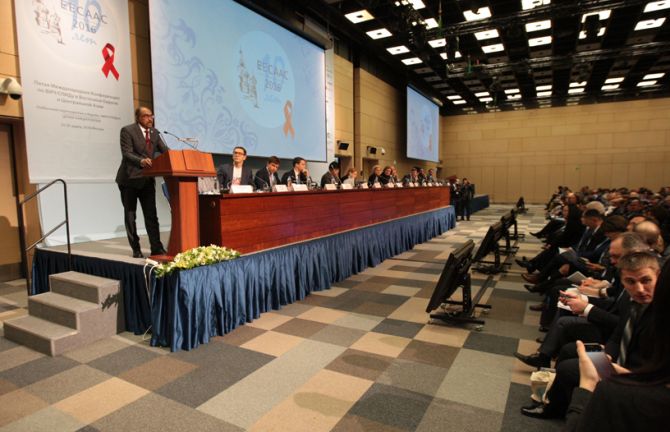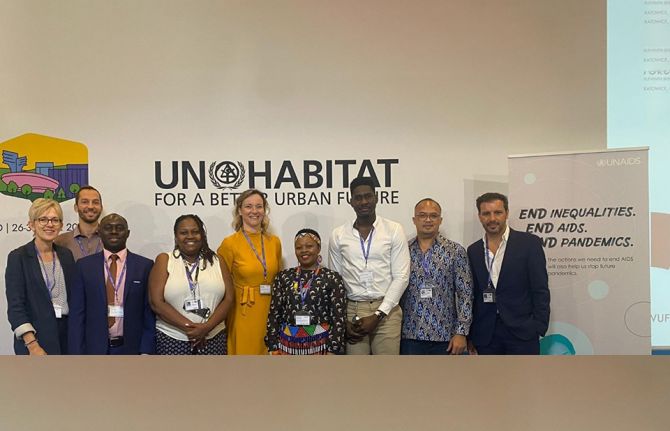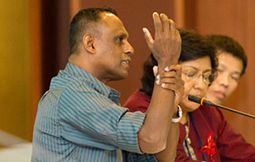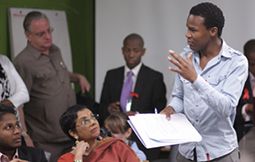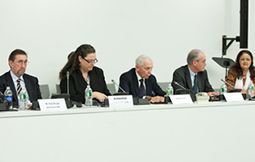
Feature Story
New UNAIDS policy on HIV and international labour migration
16 July 2008
16 July 2008 16 July 2008
Recent estimates indicate that 86 million
people across the world are international
labour migrants.
Photo: ILO/UNAIDS/H.J.Davis
Recent estimates indicate that 86 million people across the world are international labour migrants. Migrant workers bring huge benefits to their families and countries of origin through remittances – the sending of money home; and to their countries of destination by contributing to the workforce, economy and society in which they live. Yet at the same time, migrant workers face particular risks and vulnerabilities to HIV which must be addressed.
UNAIDS, in collaboration with the International Labour Organization (ILO) and International Organization for Migration (IOM) have developed a policy brief focusing on the HIV-related needs and rights of international labour migrants, irrespective of their legal status and whether their stay in the destination country is short or long term.
HIV risk
Migrant workers often experience isolation and stress as a result of being separated from their families and communities, or perhaps having to deal with harsh working and living conditions. These factors can lead them to engage in behaviours which increase their risk of HIV, such as unsafe commercial or casual sex. Wives and partners of migrant workers who stay in their home countries may also be put at risk of HIV, for example if their husband returns home HIV positive. Yet businesses which employ migrant workers can and are doing things to alleviate some of these risks.
“We have made good progress towards providing family-friendly accommodation or housing allowances, so that migrant workers can bring their families with them if they wish,” notes Brian Brink and Edward Bickham of AngloAmerican, a global mining company with employees in countries hard hit by HIV such as South Africa.
International labour migration and people living with HIV

Migrant workers, irrespective of their HIV
status, need to be able to access culturally
and linguistically appropriate HIV
programmes in origin, transit and destination
countries. Photo: ILO/UNAIDS/J.Maillard
International labour migrants who acquire HIV in transit or destination countries, or who are already living with HIV, often don’t have adequate access to HIV and health services. Migrant workers, irrespective of their HIV status, need to be able to access culturally and linguistically appropriate HIV programmes in origin, transit and destination countries.
Governments, civil society, businesses, employee organizations and international organizations all have a role to play in addressing HIV among migrant workers.
“Working abroad is full of challenges and threats – and one of the threats is HIV,” notes Nerissa Mercado of the Overseas Workers Welfare Agency in the Philippines. “We must help ensure our overseas Filipino workers come home with success stories and are HIV free; after all, their sacrifices help keep the economy afloat. We must likewise assist them if they do become HIV positive”.
Migration and human rights
More than 100 countries place restrictions on people living with HIV in entering or remaining in a country for any purpose, and international labour migrants may be refused entry or face deportation if they are found to be HIV positive. Where HIV testing occurs in the context of migration, internationally agreed standards on informed consent, confidentiality, counselling and referral to services are not routinely applied. Furthermore, international labour migrants receiving anti-retroviral treatment in the destination country may also have their treatment disrupted by deportation, if they do not have access to HIV and health services in their home countries.
International labour migrants, whether in regular or irregular status, should have the same human right to health as nationals. Respecting and promoting their health is essential for achieving national and international public health goals such as universal access to HIV prevention, treatment, care and support, as well as improving the productivity and economic independence of individuals and families.
New UNAIDS policy on HIV and international labour
Cosponsors:
International Labour Organization (ILO)
%Partners:
International Organization for Migration (IOM)
%Press centre:
Statement of the UNAIDS Secretariat to the Sixty-First World Health Assembly - Health of Migrants (21 May 2008)
Feature stories:
European meeting discusses migration, TB and HIV (15 October 2007)
Publications:
UNAIDS Policy brief - HIV and International Labour Migration (UNAIDS, ILO, IOM) (pdf, 206 kb)
Expanded version: UNAIDS Policy brief - HIV and International Labour Migration (UNAIDS, ILO, IOM) (pdf, 210 kb)
Related
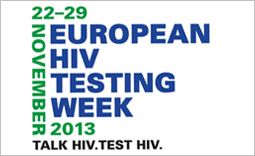 Know your HIV status: First European testing week takes off
Know your HIV status: First European testing week takes off

27 November 2013

Feature Story
ILO sees significant improvement in workplace attitudes to HIV
25 April 2008
25 April 2008 25 April 2008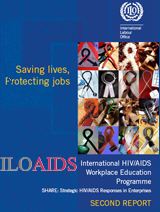
"Saving lives, protecting jobs" is a
new report from the ILO project
Strategic HIV/AIDS Responses in
Enterprises
Better HIV policies and practices in the workplace have led to more supportive attitudes towards co-workers living with HIV, the International Labour Organization (ILO) reports in its new publication “Saving lives, protecting jobs”.
The report summarizes the activities of the Strategic HIV/AIDS Responses in Enterprises (SHARE) project active in over 650 workplaces in 24 countries, covering almost one million workers.
“Several countries offer outstanding examples of how they address HIV/AIDS using the workplace for prevention, care and support, and to tackle stigma and discrimination,” said Director of the ILO Programme on HIV/AIDS and the world of work, Dr Sophia Kisting.
The report includes data on the impact of workplace HIV activities and non-discrimination policies. This data was gathered by the ILO over the past four years from six pilot countries – Belize, Benin, Cambodia, Ghana, Guyana and Togo.
In each of the six pilot countries, workers demonstrated “a marked improvement” in attitudes towards people living with HIV and employers’ and workers’ groups are increasingly making use of the ILO’s Code of Practice on HIV/AIDS
In Ghana, the percentage of workers who reported having a supportive attitude towards co-workers living with HIV increased from 33 per cent to 63 per cent. In all six countries surveyed, the proportion of workers who reported supportive behaviour towards co-workers living with HIV rose from 49 per cent to 63 per cent on average during the life of the programme.
In addition to tracking changes in attitudes related to HIV, the new report also presents a series of good practices and data collected from workplaces, ministries of labour, employers’ and workers’ organizations collaborating with the ILO.
The data also showed a rise in all six countries in the percentage of workers who reported using condoms with non-regular partners from 74 per cent to 84 per cent.
Success in developing HIV policies is firmly rooted in the collaboration between workers’ and their employers’. With 33 million people living with HIV, the majority of whom are still working and in their most productive years, the workplace is an important forum for addressing HIV.
It can be one of the most effective settings for responding to the AIDS epidemic as workplaces are communities where people come together to discuss and learn from one another. Existing structures and facilities can also be used for prevention, care and support services.
ILO plan to hold a series of events in a campaign to highlight HIV and the world of work. The report will also be presented to the global AIDS community at the International AIDS Conference in Mexico on 3-8 August.
ILO sees significant improvement in workplace att
Policy and guidelines:
Key operational guidelines of the UNAIDS Programme
Technical Policies of
the UNAIDS programme
Workplace - Umbrella Policies
Cosponsors:
International Labour Organization (ILO)
Feature stories:
AIDS: everybody’s business (26 January 2006)
External links:
Stories from the field - The ILO/USDOL International HIV/AIDS Workplace Education Programme
Publications:
Saving lives, protecting jobs. SHARE Report April 2008 (3.7 Mb, pdf) ( fr )
ILO Code of Practice on HIV in the workplace

Feature Story
Developing strategies to work with FBOs
10 April 2008
10 April 2008 10 April 2008
The faith community makes a major
contribution to the worldwide response to
AIDS, especially in poorer developing
countries, where faith-related facilities may
be the sole source of health assistance.
Seventy percent of the world’s population identify themselves as members of a faith community, which situates communities of faith in a privileged position to influence people’s behaviour and attitudes, even in relationship with the AIDS epidemic.
Organizations motivated by religious faith - often called Faith-based organizations (FBOs) - have been involved in the AIDS response since the earliest days of the epidemic and have often been among the first to respond, providing services, education and care.
UNAIDS in collaboration with UNFPA, WHO, ILO and UNDP will bring together a working group of partnership officers from across the UNAIDS Secretariat and Cosponsor organizations and FBO representatives to outline a strategy for future work with faith-based organizations on AIDS issues. The meeting, which will take place from 9 – 11 April in Geneva, will aim to establish a strategy for a more coordinated response to partnership work among all stakeholders involved in the AIDS response.
Religious communities, mosques, temples, churches, hospitals and clinics have reached out to provide support to those living with and affected by HIV. Many have been involved in the response since the earliest days of the epidemic. Their leadership has great influence in the lives of many people, and leaders speaking out responsibly about AIDS can make a powerful impact at both community and international level.

Participants will analyse how to best work
with the wide range of FBOs working on
AIDS, discussing the opportunities and
challenges that they offer.
However the response of the religious community can also be negative. People living with HIV have been stigmatized by religious leaders and communities of faith. Approaches to HIV prevention methods and attitudes towards people at increased risk of HIV infection such as men who have sex with men, have sometimes hindered the response. Much work remains to be done to eradicate stigma and discrimination.
The faith community makes a major contribution to the worldwide response to AIDS, especially in poorer developing countries, where faith-related facilities may (in some areas) be the sole source of health assistance. The ARHAP/WHO report (2007) found that faith-related organizations were providing 33 to 40 percent of all HIV health care and treatment services in Zambia and Lesotho, and calculated that between 30 and 70 percent of all healthcare infrastructure across the continent is operated by faith-based groups.
Furthermore, it is clear that faith communities are ideally placed to respond in the broadest way to the epidemic’s challenges, not just as providers of services but also (and perhaps most importantly) as networks and movements that reach right to the heart of community and family life. This makes them key players in a holistic, multifaceted, integrated response to AIDS. It is for this reason that UNAIDS is currently exploring a deeper engagement with ‘faith-based organizations’.
Participants at this meeting will analyse how to best work with the wide range of FBOs working on AIDS, discussing the opportunities and challenges that they offer. The working group will produce a three to five years strategy that will guide the UNAIDS and its cosponsors efforts to consolidate a coordinated response to AIDS with the faith community.

Feature Story
European meeting discusses migration, TB and HIV
15 October 2007
15 October 2007 15 October 2007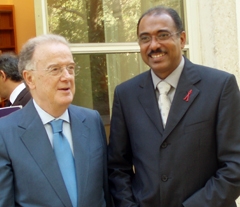
UNAIDS Deputy Director Michel Sidibe with former
President of Portugal and United Nations Special
Envoy to the Stop TB Programme, Jorge Sampaio.
Migration, mobile populations and tuberculosis were priority focus areas at the meeting of EU national AIDS Coordinators, organized by the Portuguese Presidency of the European Union. UNAIDS Deputy Director Michel Sidibe stressed that increased action in these areas is vital in the goal of universal access to HIV prevention, treatment, care and support.
“European governments have a big part to play in making universal access a reality,” said UNAIDS Deputy Director, Michel Sidibe. Underlining commitments on AIDS made by the EU member states, he urged governments to “provide leadership and funding at home and abroad [with] a special duty to support neighbours in Eastern Europe and North Africa.”
Held as part of the events organized during the Portuguese Presidency of the EU, participants included representatives from EU Member States and neighbouring countries.
With increased labour migration, or the movement of people across borders in the region, the issue of AIDS specific issues and responses concerning migrants and mobile populations in Europe was high on the meeting agenda.
Numerous factors related to migration, including socio-economic and cultural factors as well as government processes and the conditions in destination countries, impact on HIV risk and the rights of migrants living with HIV.
“AIDS spreads as economies boom - as people move from rural to urban areas, from country to country, in search of a better life,” said UNAIDS Deputy Executive Director Michel Sidibe, underlining that movement across borders introduces HIV risk as people spending long periods of time away from home are more likely to engage in casual sex, may be placed in situations which make them vulnerable to HIV and often find themselves living on the margins of society, where they cannot access the HIV prevention and treatment services they need.
“This is made worse when there is no consistency between States regarding access to HIV services. In some countries undocumented migrants can access services – provided they know where to go. In others they can’t. In some, they have to pay at point of service delivery; at others they don’t. This is not universal access!” Sidibe said, noting that UNAIDS, the International Labour Organization and the International Organization of Migration are currently drafting a policy on HIV and migration which is expected for release shortly.
Focus on migrant workers within the AIDS response is key, he underlined, “for humanitarian and human rights reasons. For public health reasons and for socio-economic reasons: if migrants are healthy, they can make an active contribution to economic growth.”
Sidibe noted Portugal’s response to the issue of HIV and migration as an example of best practice that should be built on across the EU. “Portugal has blazed a brave trail in two key areas - introducing harm reduction programmes for injecting drug users and providing HIV services to migrants – documented and undocumented,” he said.
Tuberculosis and the interaction between TB and HIV epidemics in the region was also a key focus area for the EU meeting. The development and spread of multi-drug resistant and extensively drug resistant tuberculosis, especially among people living with HIV, was underlined as a serious concern for Europe and Africa, and one that threatens the achievement of universal access and the millennium development goals.
Underlining the need for a joint response to TB and HIV in the region and worldwide, the UNAIDS Deputy Executive Director met with former Portuguese President and UN Special Envoy to the Stop TB Partnership, Jorge Sampaio. At the meeting, Sidibe stressed UNAIDS commitment to advocating for a joint response on TB and HIV and encouraged Special Envoy Sampaio to continue his important work on these key health issues.
During his intervention in Lisbon, the UNAIDS Deputy Executive Director also met with the Portuguese Minister of Health, Mr Correia de Campos, Secretary of State for European Affairs, Mr Manuel Lobo Antunes and with the Executive Secretary of the Community of Portuguese-speaking Countries, Ambassador Luís de Matos Monteiro da Fonseca. In all meetings, Sidibe underlined the importance of the next European Union - Africa Summit and that it will be crucial to have AIDS on the agenda.
“We must lead by example and assure universal access to HIV prevention, treatment, care and support within this region by 2010,” said Sidibe.
Links:
Read more on migration

Press Release
UNAIDS and ITUC to work together to increase access to HIV services for workers
25 April 2012 25 April 2012GENEVA, 25 April 2012—The Joint United Nations Programme on HIV/AIDS (UNAIDS) and the International Trade Union Confederation (ITUC) have signed a memorandum of understanding to eliminate stigma and discrimination, protect human rights and facilitate access to HIV prevention, treatment, care and support for workers.
“This MOU will result in further bringing the voice of workers to the AIDS response. An effective engagement of trade unions will enhance the protection of rights at work and contribute to the realization of the goal of getting to Zero,” says Mr Juan Somavia, Director-General of the ILO.
One of the commitments adopted by United Nations Member States in the 2011 Political Declaration on AIDS is to mitigate the impact of the epidemic on workers, their families and their dependents, as well as the impact on workplaces and economies. The declaration also calls for the effective implementation of the International Labour Organization’s (ILO) standards on AIDS and the world of work.
“The trade union movement is deeply committed to the AIDS response. The involvement of unions enhances and strengthens both the credibility and effectiveness of workplace initiatives. Protection from discrimination at work, and ensuring access to HIV prevention and treatment services are also crucial areas in which unions are fully engaged,” said ITUC General Secretary Sharan Burrow.
In 2010 a non-governmental consultation on stigma and discrimination found that more than one third of people living with HIV had experienced loss of employment, denial of health care, social or vocational exclusion and/or involuntary disclosure.
“It is unacceptable that people lose their jobs or source of income because of their HIV status,” said Michel Sidibé, Executive Director of UNAIDS. “Trade Unions are vitally important in the AIDS response to protect workers’ rights and inform workers about access to HIV services.”
UNAIDS and the ITUC, in collaboration with ILO, will unite efforts on a number of specific activities to increase HIV services for workers including advocating to remove travel restrictions for people living with HIV, to enforce laws which protect people living with HIV and access to justice, to mobilize political commitment and to trigger debate on young people, employment and HIV.
Contact
UNAIDS GenevaSophie Barton-Knott
tel. +41 22 791 1697
bartonknotts@unaids.org
ITUC Brussels
Mathieu Debroux
tel. +32 476 621 018
Mathieu.Debroux@ituc-csi.org

Press Release
UNAIDS and IOM sign agreement to improve access to HIV services for migrants
21 January 2011 21 January 2011Geneva, 21 January 2011—The Joint United Nations Programme on HIV/AIDS (UNAIDS) and the International Organization for Migration (IOM) today signed a new cooperation agreement to overcome HIV-related challenges faced by many migrants.
The agreement seeks to integrate human rights and the needs of migrants and mobile populations into national and regional HIV responses and ensure universal access to HIV prevention, treatment, care and support.
“Healthy migrants contribute significantly to achieving healthy economies,” said Michel Sidibé, Executive Director of UNAIDS. “States and other actors in the AIDS response have a fundamental duty to ensure the safety and well-being of migrants—this must include access to HIV services.”
Under the new agreement, IOM and UNAIDS will also focus on enhancing social protection for migrants affected by HIV; stopping violence against migrant women and girls and removing punitive laws, policies, practices, stigma and discrimination related to HIV and population mobility that block effective responses to AIDS.
"Government and civil society are becoming increasingly concerned about the potential vulnerability of migrants to HIV infection. By strengthening our partnership and pooling our respective expertise on HIV and migrants, our two organizations can address this critical issue more effectively," said IOM Director General William Lacy Swing.
In addition UNAIDS and IOM will work on strengthening technical support to help governments, regional institutions and civil society reduce vulnerability to HIV among mobile and migrant populations. The two organizations will also continue cooperation on research to deepen the understanding of HIV and population mobility.
IOM and UNAIDS have a long-standing partnership, formalized in a 1999 Cooperation Framework which was updated in 2002. This is now replaced by today’s new agreement. IOM’s HIV and population mobility programme not only complements the work of UNAIDS globally, but the Organization is also part of the UN Joint Team on HIV/AIDS at the country level.
UNAIDS is committed to improving access to HIV services for migrants and has included mobility in its Strategy 2011-2015 which states that HIV responses must create space to involve marginalized and disempowered people, such as migrants.
HIV projects are a significant part of IOM’s work, comprising the second largest area of migrant health projects implemented after health assessments. They are part of IOM’s broader efforts to ensure migrant access to health services regardless of migration status, throughout the migration process.

Press Statement
UNAIDS welcomes international labour standard on HIV
17 June 2010 17 June 2010 The new standard was adopted by delegates to the International Labour Conference, following two years of intense and constructive debate. Geneva, 17 June 2010.
The new standard was adopted by delegates to the International Labour Conference, following two years of intense and constructive debate. Geneva, 17 June 2010.Credit: ILO
Geneva, 17 June 2010 - A landmark labour standard was adopted by governments, employers and workers at the annual conference of the International Labour Organization (ILO). The standard aims to strengthen the global response to HIV in the workplace.
Building on the ILO 2001 Code of Practice on HIV/AIDS, the new labour standard will reinforce and extend anti-discrimination policies in the world of work. It reaffirms the right to continued employment regardless of HIV status and asserts that workers should not be screened for HIV for employment purposes. The standard also recognizes the need for focused action to protect the rights of populations that may be more vulnerable to HIV infection.
“Workers are the lifeblood of the economy and must be protected,” said Michel Sidibé, Executive Director of UNAIDS. “The new ILO standard will bring us one step closer to our goal of universal access to HIV prevention, treatment, care and support.”
HIV affects the most economically active age range in every population. A majority of the 33.4 million people living with HIV are workers with skills and experience that their families, communities and countries can ill afford to lose.
The new labour standard is the first internationally-sanctioned instrument that focuses specifically on HIV in the workplace. It is expected to significantly enhance the impact of HIV prevention and treatment programmes in the workforce globally.
Right Hand Content
Press centre:
Download printable version (pdf, 24 Kb.)
Contact:
UNAIDS Geneva
Saira Stewart
Tel +41 22 791 2511
Email stewarts@unaids.org

Press Release
UNAIDS, Universal Postal Union, UNI Global Union and ILO launch global HIV prevention campaign
07 July 2009 07 July 2009GENEVA, 7 July 2009 - The Joint United Nations Programme on HIV/AIDS (UNAIDS), the Universal Postal Union (UPU), the International Labour Organization (ILO) and UNI Global Union are launching a global HIV prevention campaign in post offices around the world.
In an initial roll out, the campaign is being launched in some 16,000 post offices in seven pioneering countries: Brazil, Burkina Faso, Cameroon, China, Estonia, Mali and Nigeria. The campaign materials provide both visitors and employees with important information about how to prevent HIV through a series of eye-catching posters and hand-outs. The materials also give the address of a multi-language website on HIV prevention, hosted by UNAIDS, which provides detailed information about how to prevent infection.
“With more than 7,400 new infections occurring every day it is clear that HIV prevention efforts need to be stepped up urgently,” said Michel Sidibé, Executive Director of UNAIDS. “The postal network has an extremely wide outreach; it is open to everyone from the young to the old and is an excellent and innovative way to raise awareness about how to prevent HIV”.
Over the next three years, the campaign will be expanded globally, potentially making its way into 600,000 post offices worldwide. This would mean that millions of people who use postal services every day as well as the 5.5 million postal employees would receive important information about how to prevent HIV transmission.
UPU Director General Edouard Dayan said, “With 600,000 post offices around the world, the postal network is a natural partner for this HIV-prevention awareness campaign. It is the single largest health-awareness initiative ever launched globally by the postal sector, demonstrating the huge outreach and value of the universal services it provides.” He added that, “The campaign is a strong example of what one industry can do to help achieve the important Millennium Development Goal of halting and beginning to reverse the spread of HIV by 2015.”
Among the pioneer countries, the Cameroonian postal operator is hoping that running the campaign through its 250 outlets will make an impact on the country’s HIV prevalence rates, which according to the latest data is at around 5% of people aged between 15 and 49. “Raising awareness on HIV is crucial,” said Abraham Sizimboue, Campost’s Acting Director General. “HIV touches the lives of a very large part of our population so we are very pleased to be running such an important campaign in our post offices here.” It is the first time that the postal system in Cameroon has participated in a health campaign.
Assane Diop, Executive Director of the International Labour Organisation’s Social Protection Sector, said: “The campaign promotes the development of a workplace policy for postal workers everywhere, as well as creatively using the opportunities of the postal network and its structures in each country to raise awareness of HIV/AIDS and counter stigma and discrimination. The ILO works actively with its partners to promote a fair globalization. This includes ensuring that responses to the economic crisis are informed by the ILO’s goals of decent work based on social justice and take an integrated approach that includes factoring in the implications of HIV/AIDS.”
Together with the campaign partners, the ILO will prepare a toolkit to guide the development of workplace policies and the implementation of programmes on HIV prevention, care and support for workers and managers.
UNI Global Union’s General Secretary Philip J. Jennings said, "Postal Workers and their families are also touched by HIV and AIDS. Healthy employees contribute to the decent living of their families as well as the good functioning of the company and the postal network as a whole. Furthermore, postal workers contribute fundamentally to the universal service, which represents an important mean to outreach to communities and support them. This joint campaign and the toolkit prepared by UNI post & Logistics Global Union and the ILO is also an opportunity to have employees and employers discuss and prevent HIV as well dialogue on broader issues such as health and safety. " The campaign will culminate in 2011, with the UPU encouraging its member countries to issue postage stamps that year to commemorate the discovery of AIDS thirty years earlier. It was in 1981 that the disease was first discovered.
UNAIDS, Universal Postal Union, UNI Global Union
Press centre:
Download printable version (pdf, 35.4 Kb.)
Multimedia:
View photo gallery of campaign launch
Feature stories:
International post office network to share HIV prevention messages (07 July 2009)
Contact:
UNAIDS: Sophie Barton-Knott
Tel. +41 22 791 1697
E-mail: bartonknotts@unaids.org
Rhéal LeBlanc
Tel. +41 31 350 3251
E-mail: rheal.leblanc@upu.int
John Myers
Tel. +41 22 799 7860
E-mail: myers@ilo.org
Esther Bares
Tel. +41 22 365 2187
E-mail: Esther.Bares@uniglobalunion.org
Publications:
The Global Economic Crisis and HIV Prevention and Treatment Programmes: Vulnerabilities and Impact (pdf. 1,09 Mb.)
Related
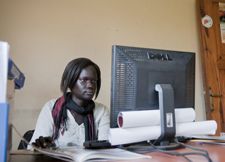 Almost 5 million workers reached under ILO’s VCT@WORK initiative and 3 million tested for HIV
Almost 5 million workers reached under ILO’s VCT@WORK initiative and 3 million tested for HIV

14 July 2016
HoA
04 August 2014
ilo web
04 August 2014
Related
 Almost 5 million workers reached under ILO’s VCT@WORK initiative and 3 million tested for HIV
Almost 5 million workers reached under ILO’s VCT@WORK initiative and 3 million tested for HIV

14 July 2016
HoA
04 August 2014
ilo web
04 August 2014

